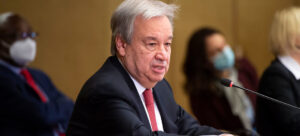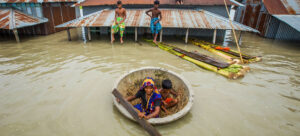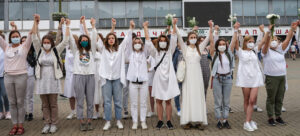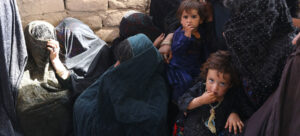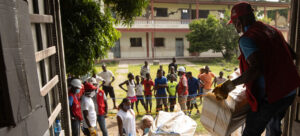COP26
Let’s start with the name of the event itself, COP26. In layman’s terms, this is the 26th UN climate change conference, but officially it is the 26th Conference of the Parties (or COP) to the UN Framework Convention on Climate Change (UNFCCC). Let’s break that down a bit…
The UNFCCC was established following the 1992 UN Conference on Environment and Development in Rio (often referred to as the Earth Summit). The stated aim of the UNFCCC was to reduce greenhouse gases in order to prevent dangerous climate change caused by human activity.
Conferences of the Parties to the convention, or COPs, are the formal meetings that have taken place every year since 1995, apart from 2020: the COVID-19 pandemic meant that COP26 was delayed by a year.
SDG
There are 17 inter-linked Sustainable Development Goals, or SDGs, which focus on challenges ranging from clean energy access, to poverty reduction and responsible consumption.
Together, the SDGs make up the 2030 Agenda for Sustainable Development, the UN’s blueprint for peace and prosperity for people and the planet.
Climate Change is one of the Goals (SDG 13), but t’s becoming increasingly clear that climate change plays a role in many, if not all of the SDGs, and that achieving the 2030 Agenda will be impossible without making serious inroads into tackling the problem.
NDC
This stands for Nationally Determined Contribution, the detailed plan that individual countries are required to make, under the Paris Agreement, to show how they will cut the amount of harmful greenhouse gases they emit. All countries are expected to revise their NDC to reflect greater ambition.
Presently, these plans are not sufficient to keep global warming to 1.5° Celsius above pre-industrial levels, so this year, there is increased pressure on countries to sharply increase their level of ambition.
Net Zero
Put simply, net zero means cutting emissions to as close to zero as possible, such as by moving toward a green economy and clean renewable energy, with any remaining emissions reabsorbed, including oceans and forests.
Practically every country has joined the Paris Agreement on climate change, which calls for keeping the global temperature to 1.5°C above pre-industrial era levels.
If we continue to pump out the emissions that cause climate change, however, temperatures will continue to rise well beyond 1.5, to levels that threaten the lives and livelihoods of people everywhere.
This is why a growing number of countries are making commitments to achieve “net zero” emissions by 2050. It’s a big task, requiring ambitious actions starting right now.
1.5°C
You’ll be hearing “the goal of 1.5 degrees Celsius” a lot during COP. In a 2018, an IPCC report, reviewed by thousands of scientists and governments, found that limiting global temperature rise to no more than 1.5°C above pre-industrial levels (in the mid-18th century), would help us avoid the worst climate impacts and maintain a liveable climate.
According to the latest data, our world has already warmed between 1.06 to 1.26 above pre-industrial levels, and even if current promises are met, we would still be on a course to reach 2.7°C this century. This would mean a “climate catastrophe” as highlighted by the UN Secretary-General, with a possible collapse of ecosystems, and life as we know it.
IPCC
The Intergovernmental Panel on Climate Change (IPCC) is the UN body for assessing the science related to climate change.
Created in 1988 by the World Meteorological Organization (WMO) and the UN Environment Programme (UNEP), the objective of the IPCC is to provide governments at all levels with scientific information that they can use to develop climate policies.
IPCC reports are also a key input into the international climate change negotiations that will be happening during COP26. A major report released in August showed that unless there are rapid, sustained and large-scale reductions of greenhouse gas emissions, including CO2, methane and others, the goal of limiting global warming to 1.5C will be beyond reach.
SIDS
Small Island Developing States are a distinct group of 58 low-lying island nations that are highly vulnerable and often affected by weather extremes and climate change, including the increased severity of cyclones, storm surges, heavy rains, droughts, sea-level rise and ocean acidification.
During the latest high-level week of the General Assembly, SIDS leaders from Fiji, Tuvalu and the Maldives took centre stage saying their nations are facing an existential threat if rich countries fail to make good on their promises to turn the tide on global warming.
Climate finance
Broadly speaking, climate finance relates to the money which needs to be spent on a whole range of activities to reduce the emissions that are causing climate change, and to help people adapt to and build resilience for the impacts of climate change that are already occurring.
It can involve local, national, or transnational financing, which may be drawn from public, private and alternative sources of financing. Climate finance is critical to addressing climate change, because large-scale investments are required to significantly reduce emissions, notably in sectors that emit large quantities of greenhouse gases, and to help adaptation efforts.
In 2009, during the COP15 in Copenhagen rich nations promised to channel $100 billion a year to less-wealthy nations by 2020, to help them adapt to climate change and mitigate further rises in temperature.
The promise still hasn’t been delivered—climate finance to developing countries presently amounts to about $80 billion–, and therefore climate finance will be one of the biggest issues of discussion during COP26.
SBTi
This stands for the UN-backed Science Based Target initiative. Companies which sign up to the initiative set science-based emission reduction targets, which leave them better equipped to tackle climate change, and making them more competitive, in the transition to a net-zero economy.
Science-based target setting has become a standard business practice, and corporations are playing a major role in driving down global greenhouse gas emissions and in supporting the implementation of country commitments.
Nature-based Solutions
Nature-based Solutions are actions to protect, sustainably manage, and restore natural and modified ecosystems that address societal challenges effectively and adaptively, simultaneously providing human well-being and biodiversity benefits.
Nature-Based Solutions are an essential part of the overall global effort to achieve the goals of the Paris Agreement on Climate Change: they are a vital complement to decarbonisation, reducing climate change risks and establishing climate resilient societies.
Examples include massive tree planting programmes, which absorb carbon and provide protection from intense rainfall, and rebuilding mangroves, which provide effective and cheap natural barriers against coastal floods and shoreline erosion.
G20
The Group of 20 (G20) is an intergovernmental forum comprising most of the world’s largest economies: 19 nations and the European Union. They work to address major issues related to the global economy, such as international financial stability, climate change mitigation, and sustainable development.
The UN Secretary-General has made clear that climate action must be led by G20 nations, which collectively account for around 90 per cent of gross world product, 75-80 per cent of international trade and two thirds or the world’s population.
Their commitment during COP26 is crucial for curbing greenhouse gases and stop fuelling climate change.
AGN
The African Group of Negotiators on Climate Change (AGN) was established at COP1 in Berlin, Germany in 1995 as an alliance of African member states that represents the interests of the region in the international climate change negotiations, with a common and unified voice.
GCAA
Outside the formal intergovernmental negotiations, countries, cities and regions, businesses and civil society members across the world are already taking action for the climate.
The Global Climate Action Agenda (GCAA), initiated under the Lima Paris Action Agenda, was launched to spur rapid climate action, boost cooperation between governments, local authorities, the business community, investors, and civil society, and to support the adoption and the implementation of the Paris Agreement.
UN News is producing special coverage from COP26 in Glasgow. You can find all our COP-related stories here.

